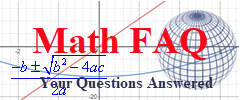Health insurance, taxes and many consumer applications result in a models that are piecewise functions. To prove these functions are continuous at some point, such as the locations where the pieces meet, we need to apply the definition of continuity at a point.
A function f is continuous at a point x = a if each of the three conditions below are met:
i. f (a) is defined
ii. $latex \displaystyle \underset{x\to a}{\mathop{\lim }},f(x)$ is defined
iii. $latex \displaystyle \underset{x\to a}{\mathop{\lim }},f(x)=f(a)$
In the problem below, we ‘ll develop a piecewise function and then prove it is continuous at two points.
Problem A company transports a freight container according to the schedule below.
- First 200 miles is $4.00 per mile
- Next 300 miles is $3.00 per mile
- All miles over 500 is $2.50 per mile
Let C(x) denote the cost to move a freight container x miles.
a. Find a piecewise function for C(x).
For this function, there are three pieces. The first piece corresponds to the first 200 miles. The second piece corresponds to 200 to 500 miles, The third piece corresponds to miles over 500.
The board below show the function.
Let’s break this down a bit. In the first section, each mile costs $4.50 so x miles would cost 4.5x.
In the second piece, the first 200 miles costs 4.5(200) = 900. All miles over 200 cost 3(x-200). This gives the sum in the second piece.
In the third piece, we need $900 for the first 200 miles and 3(300) = 900 for the next 300 miles. In addition, miles over 500 cost 2.5(x-500).
b. Prove that C(x) is continuous over its domain.
Each piece is linear so we know that the individual pieces are continuous. However, are the pieces continuous at x = 200 and x = 500?
Let’s look at each one sided limit at x = 200 and the value of the function at x = 200.


This means that the function is continuous for x > 0 since each piece is continuous and the function is continuous at the edges of each piece.



